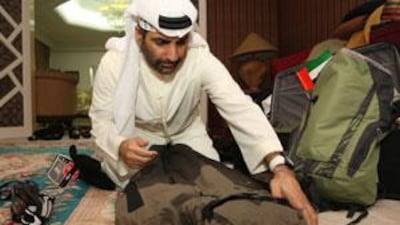DUBAI // Sheikh Abdulaziz bin Ali bin Rashed Al Nuaimi revels in his reputation as the "down to earth Sheikh". As the 44-year-old Ajman royal arrives at a hotel in Dubai, he greets and hugs the valets and hands out Gingerbon sweets.
"Now when you taste ginger you'll remember Sheikh Abdulaziz," he laughs. But his humility and humour mask a strong sense of purpose. "If I wasn't [down to earth] you wouldn't see me here, coming down from Ajman to you for an interview," he says. "Humbleness is not weak, it's a strength." Sheikh Abdulaziz, along with 70 other team members, will embark tomorrow on an expedition to Antarctica with the aim of promoting awareness about the effects of climate change, as well as to undergo leadership training.
The group will cruise through the Drake Passage and land on King George's Island, then go to a base in Bellingshausen, where yesterday the temperature was minus-1°. To the sheikh, the farthest reaches of the southern hemisphere provide the ideal setting for the task at hand. "You have to find something where you can make an impact, far away from your daily and routine life, far away from your family and country," he says.
He calls it the "un-comfort zone", where "you stretch your muscles - mental, intellectual, spiritual, emotional". "Without risk, life is meaningless," he says. Even before this expedition, his nickname was the "Green Sheikh", which he also uses for his e-mail address. "I started caring about the environment when I was six. My father was one of the three best falconers in the UAE, with Sheikh Zayed and a few other sheikhs," he says.
He learnt from the falcon, he says, which "takes what he needs, not what he desires" from the world. While his father did not know what an ecosystem was, he was a natural environmentalist, Sheikh Abdulaziz says, never using a shotgun on hunting trips but instead using falcons, the natural predators of the species he hunted. In school, Sheikh Abdulaziz gravitated towards the sciences, which led him to pursue an undergraduate degree in chemical and petroleum engineering at UAE University.
After a stint in the military, he joined the petroleum industry in 1992, working on remote Das Island, well off the coast of Abu Dhabi, five days a week. "I worked in Das Island for three years as a process engineer and no one knew I was a sheikh," he says. "A young person, 23 years old from a royal family, left his wealth, left his family, working in stressful working hours, very tough work, troubleshooting equipment [and running] simulations."
He looks back on the time as a valuable learning experience, but it left a sour taste in his mouth. "I had an impact, through the CO2 emissions, through the sulphur dioxide emissions while I was in the industry," he says. "I felt not an anger but I saw people every year dying, they were 35, 40, in the island and they die because of the emissions. It affected them mentally, physically, emotionally."
After three years on the island, he decided to quit. "I knew I wanted to convert from a chemical engineer, from a polluter to a protector, to an environmental engineer. So I converted. It's the same knowledge, just flip the chart, flip the paradigm," he says. Within two years he had earned a master's degree in environmental science studying the air pollution in Das Island, followed by a PhD in industrial ecosystems.
He was also elected in 1996 as the chairman of the Environment Friends Society, a volunteer organisation in Abu Dhabi and Dubai with more than 400 members. Most importantly, he wants to spread his message to young people. To do this on the Antarctica trip, Sheikh Abdulaziz will take a camera and recording equipment to document the effects of climate change, for instance, by measuring the level of ultraviolet radiation and the effects of ozone depletion.
He also wants to observe the positions of the stars from the south, and to calculate prayer times in Antarctica. Preparing for the cold and wind of Antarctica is a further challenge. The father of four, who is also an avid climber, as well as a scuba and sky diver, is busy readying waterproof jackets and pants, thermal clothes, boots, headlights, lotion to protect against UV rays and sea sickness pills, among other gear.
He has been meditating every few days, visualising himself exploring the tundra and glimpsing the wildlife. "I think I'm almost prepared psychologically, physically, emotionally and spiritually," the sheikh says. @Email:kshaheen@thenational.ae


